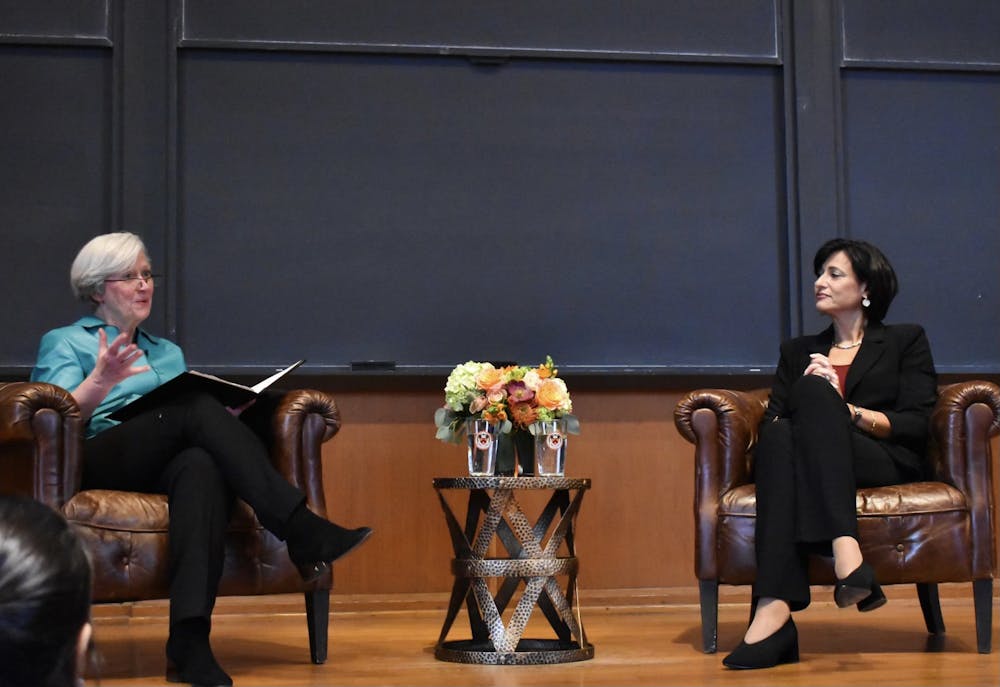Director of the Centers for Disease Control and Prevention (CDC) Dr. Rochelle Walensky sat down with President Emeritus and Professor of Molecular Biology Shirley Tilghman to discuss her career in public health, the CDC’s approach to the COVID-19 pandemic, and to give advice for current seniors as they chart their path after Princeton.
The CDC has been a focal point of political controversy for its response to the COVID-19 pandemic, and its emphasis on individual responsibility. Walensky stood by the agency, but emphasized throughout the talk the ways in which the agency can improve for future pandemic response.
Responding to Tilghman’s statement that Walensky “inherited a CDC that was underfunded, that was demoralized, that was underprepared for the pandemic,” Walensky emphasized that in the history of the CDC, this is the first instance in which the organization has been in existence during a pandemic.
“The infrastructure of public health in this country is frail,” Walensky said.
Additionally, during the pandemic, the CDC — along with other government public health agencies — has come under fire for not communicating the science behind decision-making effectively to the general public. Walensky responded to a question about this criticism by explaining that the nature of scientific communication presents a challenge amid consistently emerging knowledge.
“In my academic world, I have gotten really accustomed to presenting science to an informed audience on the subject,” she said. “And now we present data to the American people in two-minute snapshots on the nightly news.”
Walensky said that what makes addressing COVID-19 so difficult is the necessity for policies to be applicable to a number of different environments.
“As we make our public health guidance, our guidance has to be relevant and appropriate in Manhattan, in Cherokee Nation, in Guam, and in rural Montana,” Walensky said.

The CDC, according to Walensky, was unprepared to deal with a widespread public health crisis like COVID-19. Throughout the history of public health threats in the United States, including SARS, Zika, and Ebola, 60,000 public health jobs have been lost. And case counts before COVID-19 have “never been reportable at the rate of a million cases a day,” according to Walensky.
Walensky said the CDC is taking steps to prevent another crisis like COVID-19 from happening again. However, she said, the limitations of collecting data are ever-present obstacles to the CDC.
“We’re now doing genomic sequencing of tens of thousands of sequences from every single state, commercial lab every week at CDC and in collaboration,” she said. “But does every state have a genomic epidemiologist? Does every state have a lab? But can you do genetic sequencing?”
Walensky also noted her work surrounding HIV/AIDS. She has previously served as the Chair-elect of the HIV Medical Association as well as an advisor to the World Health Organization (WHO) and the joint United Nations Program on HIV/AIDS. Walensky attributed her passion for public health to her work on the HIV/AIDS epidemic when she was an intern out of medical school.

“I never thought I was going to be an infectious disease doctor,” she said. “I never thought I was going to study HIV/AIDS. When I was training in inner-city Baltimore, we were learning so much about it … We didn’t have a lot for them.”
Walensky later recalled the moment in time when the first drug cocktails to treat HIV/AIDS — a series of 14 pills taken three times a day — became available.
“People were thrilled — there was finally something that gave people hope,” she said.
Walensky reflected on the progression from her past work on the HIV/AIDS epidemic to her current work on COVID-19.
“So now fast forward to where we are with COVID-19: We have many immunocompromised people in resource-limited settings, and we really need to vaccinate them. And the same challenges that have happened here are happening around the world in terms of trust in vaccine delivery,” she said.
When it comes to vaccine hesitancy, Walensky stressed the importance of listening and empathy in understanding an individual’s reasoning.
“You don’t talk. You listen,” she said.
Walensky also gave advice to current seniors. She urged them to persist through failure, to surround themselves with people who make them better, and to think big.
“Ask the big questions. Ask the really big questions,” Walensky continued. “Because that’s how you're going to make a difference and know when to go after those questions. They’re gonna be hard, and there’s gonna be failure, but those are the ones that you guys can tackle and we need you to do so.”
The conversation took place in McCosh Hall 10 on Thursday, March 24 at 4:30 p.m. as part of the Last Lectures series.
Anika Buch is an Associate News Editor at the ‘Prince’ who typically covers STEM communities and on-campus research. She can be reached at ambuch@princeton.edu.








